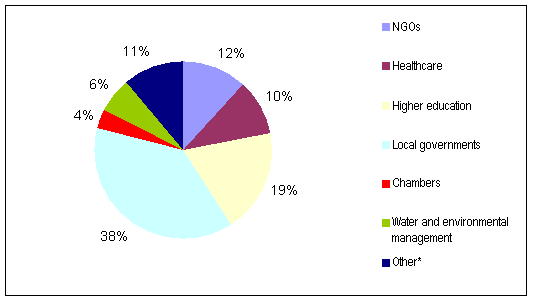Home
Downloads
2014+
With the calls opened last year, almost 122 MEUR financing became available for boosting economical and social co-operation and the joint development of the Hungarian-Romanian border region.
The 352 applications received under the first two calls for proposals of the programme shows that there is an intensive interest towards cross-border cooperation in the Hungarian-Romanian border region and local actors are willing to undertake the extra work of preparing and implementing joint projects.

In case of the first call the amount of financing requests submitted is almost double (more than 31 MEUR) the amount of available ERDF resources, while for the second call the amount requested exceeds the funds available (more than 233 MEUR requested).
Who are the Applicants?
Figures demonstrate the intense activity of NGOs in the first call, whereas the composition of applicants is somewhat different in the second call due to the fact that the latter call aimed at supporting projects with high demand of resources in the field of the development of infrastructure (healthcare institutions, local governments). It is worth mentioning that higher education institutions were equally active in both types of application rounds – soft activities and larger scale developments.
.gif)
I. Types of organisations who submitted applications within HURO/0801

II. Types of organisations who submitted applications within HURO/0802
It should be mentioned that the 2007-2013 programming period is considered the follow-up of the former cross-border cooperation programmes (Phare CBC, Interreg IIIA), nevertheless due to its size and complexity of implementation rules it is rather different.
While in the Phare CBC programme there was no possibility to prepare joint projects, the Interreg IIIA gave way to this project type as well (besides mirror and individual projects). In both instances, it became obvious that applicants tend to choose individual projects implemented under the sole responsibility of the applicant organisation. This is well demonstrated by the fact that in spite of the qualification system preferring joint initiatives, no such projects could be financed. The present programme, on the contrary, is for joints projects only. In this type of projects the level of cooperation is without doubt higher but at the same time, funds must be spent in a system formerly rejected by applicants.
The Joint Technical Secretariat was glad to take notice of the fact that applicants were able to undertake the task of preparing complex and time demanding applications based on sound professional decisions. Acting in cooperation with all partners is crucial in terms of preparation and implementation of these projects.
The most characteristic feature of the programme is that all projects must have the cross-border dimension, meaning that only initiatives which bring certain advantages for both parts can be supported. In comparison to other national programmes cross-border cooperation represents the added value, which can be underlined by new synergies developed as a result of project implementation, such as new connections/networks, knowledge transfer, common benefits, common programmes, or joint cultural events.
Related articles:
Almost 200 applications received within the 1st call for proposals! (HURO/0801)
Considerable interest in the 2nd call for proposals (HURO/0802)